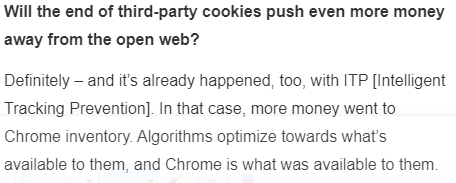
@WeAreRaptive CSO and co-founder. Talk about digital advertising, privacy, adtech, and occasionally video games. Views are mine.
How to get URL link on X (Twitter) App



https://twitter.com/anthonykatsur/status/1514270807974895622The first addition to the ads.txt spec is the OwnerDomain variable. Each publisher can specify the corporate owner of that domain. Then buyers can tie sellers.json data to ads.txt data. This will reduce confusion with "BOTH" entities (that represent and own sites), 2/
https://twitter.com/robinberjon/status/1379522150927904768With the impending death of 3PC in Chrome and them already dead in Safari, both browsers are implementing conversion measurement features to allow advertising campaigns to get some level of data about their performance. 2/

https://twitter.com/Myles_Younger/status/1280640920749174787The best way to walk through the "why are they doing this?" question, is to think through the stakeholder groups inside of Google. I believe there are at least four groups with somewhat overlapping and also contradictory needs/viewpoints. 2/